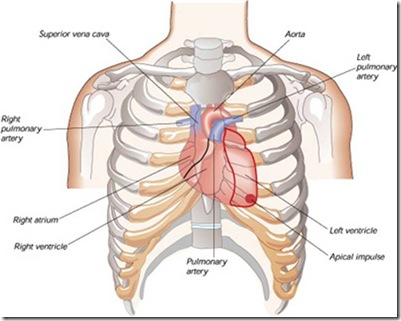The Third Trimester
Written by Doroby on 8:04 AMChanges in Your Body
 Some of the same discomforts you had in your second trimester will continue. Plus, many women find breathing even more difficult and notice they have to go to the bathroom even more often. This is because the baby is getting bigger and it is putting more pressure on your organs. Don't worry, your baby is fine and these problems will lessen once you give birth.
Some of the same discomforts you had in your second trimester will continue. Plus, many women find breathing even more difficult and notice they have to go to the bathroom even more often. This is because the baby is getting bigger and it is putting more pressure on your organs. Don't worry, your baby is fine and these problems will lessen once you give birth.
The following aches and pains often appear for the first time during the third trimester:
- Heartburn
- Swelling of the ankles, fingers, and face. If you notice any sudden or extreme swelling or if you gain a lot of weight really quickly, call your doctor right away. This could be a sign of preeclampsia or toxemia.
- Hemorrhoids
- Tender Breasts
- Trouble Sleeping
As you near your due date, your cervix becomes thinner and softer (called effacing). This is a normal, natural process that helps the birth canal (vagina) to open during the birthing process. Your doctor can check your progress with a vaginal exam.
Weight Gain
Everyone gains weight at different rates. On average, it is normal to gain about one pound per week, or three to four pounds per month, during the third trimester. By the end of your pregnancy you should have gained, on average, about 25 to 30 pounds. About 7 1/2 pounds of that weight should be the baby.
Changes in Your Baby
Your baby is still growing and moving, but now it has less room in your uterus. Because of this, you might not feel the kicks and movements as much as you did in the second trimester. During this final stage of your pregnancy, your baby is continuing to grow. Even before your baby is born it will be able to open and close its eyes and might even suck its thumb.
As your body prepares for birth, the baby will start to move into its birth position. You might notice the baby "dropping," or moving down lower in your abdomen. This can reduce the pressure on your lungs and rib cage, making it easier to breathe.
At birth, the average baby is 20 to 22 inches long and weighs 7 1/2 pounds. But newborns who weigh between 5 pounds, 11 1/2 ounces and 8 pounds, 5 3/4 ounces are considered healthy.
Sleeping in the 3rd Trimester
Your energy may lessen as you enter the ninth month. So you may begin to slow down. This is normal. It's important to get enough rest now, even though it can be more difficult to sleep as you get larger. The baby's movements, bathroom runs, and an increase in your body's metabolism can make sleeping difficult.
Try these tips for sleeping in the last three months of pregnancy:
- avoid eating large meals three hours before going to bed
- do mild exercise like walking
- avoid taking long naps during the day
- talk with your partner, friends, doctor or midwife to relieve stress
Doctors Visits
Be sure to continue seeing your doctor or midwife regularly. In the last trimester of pregnancy, women usually see their doctors or midwives more frequently. From 30 weeks to 38 weeks of pregnancy, most doctors and midwives recommend one office visit every two weeks. After 38 weeks, women normally see their doctor or midwife every week until delivery.
As your due date approaches, ask questions and share concerns you have about labor and delivery. You and your doctor will discuss what kind of delivery you will have. Some women need to have a cesarean section (c-section). During a c-section a surgical cut is made in the abdomen and uterus to remove the baby.
If you plan on a non-surgical, vaginal birth, you should talk to your doctor about the pros and cons of pain relief. Some women opt for pain medicines and others want to deliver naturally, without medicine. Many women find childbirth classes very helpful, even if they have already had a baby. Women often bring their partners or a friend or relative to childbirth classes, particularly if this person will be with them during the birth of their baby.
Inducing Labor
Did you know that only five percent of babies are born on their due dates? So being pregnant after your due date is normal and common. And it does not mean anything is wrong. But sometimes the doctor has concerns about the baby's and/or your health. In these cases, the doctor recommends inducing labor. Inducing labor means that your doctor will start your labor through artificial means. Most doctors will wait one to two weeks after a woman's due date before considering inducing.
Some reasons why doctors induce labor include:
- The mother has a chronic illness like high blood pressure or diabetes that threatens the health of the baby.
- The baby is not growing normally.
- A woman's "water breaks" which means the membranes that surround the fetus rupture but contractions don't start within a safe amount of time.
Most doctors induce labor in the hospital to ensure the health of the mother and baby. There are many ways to start contractions. Doctors can rupture the membranes (break the water) surrounding the fetus. They can also insert a suppository containing a hormone into the vagina. Most often, doctors use a medicine called Pitocin to induce labor. Pitocin is a hormone that causes contractions. Women in the hospital receive Pitocin through a vein in the arm or hand.
Deciding to Breastfeed or Bottle-Feed
If you haven't thought about whether you will breastfeed or bottle-feed your baby, it is time to start. You should learn more about both options and make a decision about what you plan to do. Breastfeeding is much better than formula-feeding for your baby's health and your own.
Find out all the facts about breastfeeding. Talk to your doctor or a pediatrician about breastfeeding. Then make the decision that is right for you. Visit our breastfeeding center to learn more about the benefits, to find out how to make it work best for you, and to get tips on breastfeeding while working.
When to Call Your Doctor
Before your due date, make sure to talk with your doctor about how to reach him or her if you go into labor. It's also helpful to be familiar with the hospital or birthing center, where you should park, and where to check in ahead of time. Know that sometimes you can think you're in labor, but really are not (called false labor). This happens to many women, so don't feel embarrassed if you go to the hospital certain that you are in labor, only to be sent home! It's always better to be seen by a doctor as soon as possible once labor has begun. Here are the signs of true labor:
Signs of Labor
- Contractions at regular and increasingly shorter intervals that also become stronger in intensity.
- Lower back pain that doesn't go away. You might also feel premenstrual and crampy.
- Your water breaks (can be a large gush or a continuous trickle) and you have contractions.
- A bloody (brownish or blood-tinged) mucous discharge. This is the mucous plug that blocks the cervix. Labor could be at any time, or days away.
- Your cervix is dilating (opening up) and becoming thinner and softer (also called effacement). During a pelvic exam, your doctor will be able to tell if these things are happening.
 | Posted in »
| Posted in »
 Most women find the second trimester of pregnancy easier than the first. But it is just as important to stay informed about your pregnancy during these months.
Most women find the second trimester of pregnancy easier than the first. But it is just as important to stay informed about your pregnancy during these months.  During the second trimester, you should continue to see your doctor for prenatal care. Most pregnant women have monthly office visits with their doctor or midwife until the end of this trimester.
During the second trimester, you should continue to see your doctor for prenatal care. Most pregnant women have monthly office visits with their doctor or midwife until the end of this trimester.



